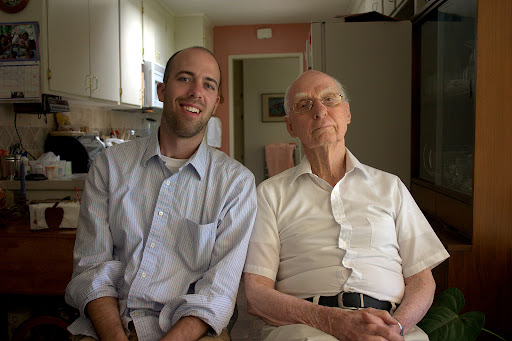 (Note 1: I originally posted this about 11 months ago but I thought it fitting to repost it as GYC approaches again. This is an appeal to all those who are preparing to present at this year's GYC in Houston, Texas.
(Note 1: I originally posted this about 11 months ago but I thought it fitting to repost it as GYC approaches again. This is an appeal to all those who are preparing to present at this year's GYC in Houston, Texas.Note 2: I started preparing this blog before David Asscherick gave his closing talk at GYC this past Sunday, January 2. I was thrilled to hear him say some of the same things that I had already been thinking about. His "cautionary" words were very appropriate and, in this post, I simply want to piggy-back on what he said in that talk. I am also glad that he said it because there are a lot more people who value his thoughts than there are who even know I exist!)
And this heart-change needs to be a daily - even moment-by-moment - experience! Thus, we need to constantly be dwelling upon the love of Christ. Or, as Ellen White says, "We must gather about the cross. Christ and Him crucified should be the theme of contemplation, of conversation, and of our most joyful emotion. We should keep in our thoughts every blessing we receive from God, and when we realize His great love we should be willing to trust everything to the hand that was nailed to the cross for us" (Steps to Christ, pp. 103, 104)."
- The sacrifice of Christ as an atonement for sin is the great truth around which all other truths cluster. In order to be rightly understood and appreciated, every truth in the Word of God, from Genesis to Revelation, must be studied in the light that streams from the cross of Calvary. I present before you the great, grand monument of mercy and regeneration, salvation and redemption--the Son of God uplifted on the cross. This is to be the foundation of every discourse given by our ministers. (Gospel Workers, p. 315)
- It is our duty to preach faith, to present the love of Christ in connection with the claims of the law; for neither can be rightly understood without the other. In every discourse the love of God, as manifested in Christ, the sinner's only hope, should be dwelt upon until the people realize something of its power and preciousness. If this is done as it should be, it will not be said of this people that they teach the law but do not believe in repentance, faith, and conversion. We want these subjects to be blended as God has blended them; then will the truth be presented in its completeness, not as a mere theory, but as a power that will transform the character. It will then be preached in demonstration of the Spirit and with power. Then those who have accepted the doctrines of the Bible will not be unfed; they will feel the vivifying influence of the Holy Spirit. (Gospel Workers, pp. 227, 228)
- Ministers and people have lost much by not dwelling more continually upon the work of our Redeemer. We should contemplate the love that led Christ to give himself as a ransom for fallen man, and this amazing love should be revealed in every discourse. The sacrifice of Christ not only makes apparent his compassion for the children of men, but also makes manifest the love of the Father; and this love ought to draw all men to God. The closest relation exists between God and his people, and the ambassador of God's truth should ever represent Christ. He should exemplify, by precept and example, the love of God, that those who are instructed by him may be brought into a position where they shall receive the divine blessing. The servants of God are to be earnest, penitent, trustful, thankful. Their lives should be living epistles, known and read of all men. They should be continually looking for that blessed hope, and the glorious appearing of the great God and our Savior Jesus Christ. The subjects dwelt upon by the gospel minister will be of a character to elevate, ennoble, and sanctify the soul. The teacher of divine truth should present the necessity of close communion with God, and dependence upon the righteousness of Christ. When the minister fully realizes his own helplessness without the aid of Christ, the danger of his becoming exalted will be removed, and Christ will absorb everything; his presence will pervade the whole soul, and impress all the senses. (Signs of the Times, January 27, 1890)
- The Lord can do little for his people, because of their limited faith. The ministers have not presented Christ in his fullness to the people, either in the churches or in new fields, and the people have not an intelligent faith. They have not been instructed as they should have been, that Christ is unto them both salvation and righteousness. The love that Christ manifested in taking human nature, in bearing insult, reproach, and the rejection of men, in suffering crucifixion on the cross, should be presented in every discourse. It is Satan's studied purpose to keep souls from believing in Christ as their only hope; for the blood of Christ that cleanseth from all sin is only efficacious in behalf of those who believe in its merit, and who present it before the Father as did Abel in his offering. (Review and Herald, September 3, 1889)
- It is true men will say, "You are too excited; you are making too much of this matter, and you do not think enough of the law; now, you must think more of the law; don't be all the time reaching for this righteousness of Christ, but build up the law." Let the law take care of itself. We have been at work on the law until we get as dry as the hills of Gilboa, without dew or rain. Let us trust in the merits of Jesus Christ of Nazareth. (1888 Materials, p. 557)
- In Christ is the tenderness of the shepherd, the affection of the parent, and the matchless grace of the compassionate Saviour. His blessings He presents in the most alluring terms. He is not content merely to announce these blessings; He presents them in the most attractive way, to excite a desire to possess them. So His servants are to present the riches of the glory of the unspeakable Gift. The wonderful love of Christ will melt and subdue hearts, when the mere reiteration of doctrines would accomplish nothing. . . . Tell the people of Him who is "the Chiefest among ten thousand," and the One "altogether lovely." The Song of Solomon 5:10, 16. (The Desire of Ages, pp. 826, 827)








